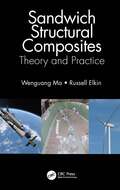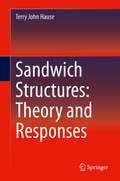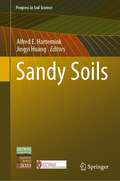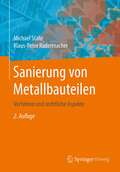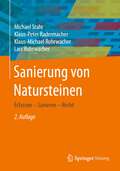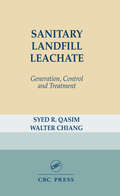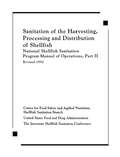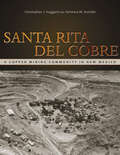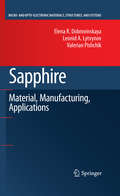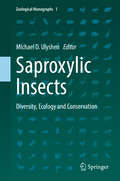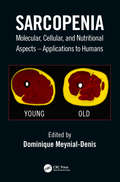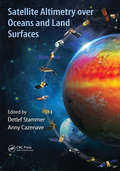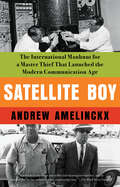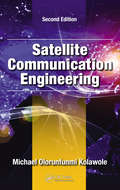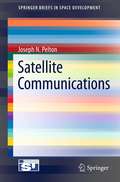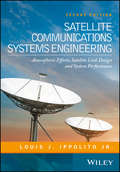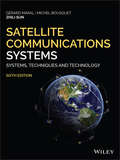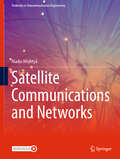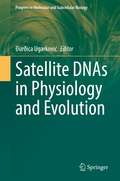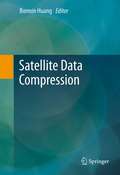- Table View
- List View
Sandwich Structural Composites: Theory and Practice
by Wenguang Ma Russell ElkinSandwich Structural Composites: Theory and Practice offers a comprehensive coverage of sandwich structural composites. It describes the structure, properties, characterization, and testing of raw materials. In addition, it discusses design and process methods, applications and damage assessments of sandwich structural composites. The book: Offers a review of current sandwich composite lamination processes and manufacturing methods Introduces raw materials, including core materials, skin reinforcements, resin substrates and adhesives Discusses sandwich structure characterization, finite element analysis of the structures, and product design and optimization Describes benefits other than structural, including acoustic, thermal, and fire Details applications in various industries, including aerospace, wind energy, marine ships, recreational boats and vehicles, sport equipment, building construction, and extreme temperature applications The book will be of benefit to industrial practitioners, researchers, academic faculty, and advanced students in materials and mechanical engineering and related disciplines looking to advance their understanding of these increasingly important materials.
Sandwich Structures: Theory and Responses
by Terry John HauseThis book provides a solid foundation from which most practical, theoretical problems related to sandwich structures can be derived and solved. The text brings together many problems found in the literature, such as those concerning buckling, post-buckling, free vibration, and dynamic response under various types of loadings. Sandwich construction with functionally graded facings is also briefly discussed, wherein topics obtain theoretical solutions from one comprehensive, consistent theory. The basic governing equations are presented in orthogonal curvilinear coordinates considering the shallow shell theory, which includes the strain-displacement equations, the constitutive equations, equations of motion, and the compatibility equations. Providing a clear theoretical foundation for engineers and research scientists in need of detail on sandwich structures in professional practice, the book is an ideal reference for understanding these structures through a comprehensive treatment of the theory, mathematical procedures, and applications.
Sandy Hook: An American Tragedy and the Battle for Truth
by Elizabeth WilliamsonBased on hundreds of hours of research, interviews, and access to exclusive sources and materials, Sandy Hook is Elizabeth Williamson&’s landmark investigation of the aftermath of a school shooting, the work of Sandy Hook parents who fought to defend themselves, and the truth of their children&’s fate against the frenzied distortions of online deniers and conspiracy theorists. On December 14, 2012, a gunman killed twenty first-graders and six educators at Sandy Hook Elementary School in Newtown, Connecticut. Ten years later, Sandy Hook has become a foundational story of how false conspiracy narratives and malicious misinformation have gained traction in society. One of the nation&’s most devastating mass shootings, Sandy Hook was used to create destructive and painful myths. Driven by ideology or profit, or for no sound reason at all, some people insisted it never occurred, or was staged by the federal government as a pretext for seizing Americans&’ firearms. They tormented the victims&’ relatives online, accosted them on the street and at memorial events, accusing them of faking their loved ones&’ murders. Some family members have been stalked and forced into hiding. A gun was fired into the home of one parent. Present at the creation of this terrible crusade was Alex Jones&’s Infowars, a far-right outlet that aired noxious Sandy Hook theories to millions and raised money for the conspiracy theorists&’ quest to &“prove&” the shooting didn&’t happen. Enabled by Facebook, YouTube, and other social media companies&’ failure to curb harmful content, the conspiracists&’ questions grew into suspicion, suspicion grew into demands for more proof, and unanswered demands turned into rage. This pattern of denial and attack would come to characterize some Americans&’ response to almost every major event, from mass shootings to the coronavirus pandemic to the 2020 presidential election, in which President Trump&’s false claims of a rigged result prompted the January 6, 2021, assault on a bastion of democracy, the U.S. Capitol. The Sandy Hook families, led by the father of the youngest victim, refused to accept this. Sandy Hook is the story of their battle to preserve their loved ones&’ legacies even in the face of threats to their own lives. Through exhaustive reporting, narrative storytelling, and intimate portraits, Sandy Hook is the definitive book on one of the most shocking cultural ruptures of the internet era.
Sandy Soils (Progress in Soil Science)
by Alfred E. Hartemink Jingyi HuangSandy soils cover approximately 900 million ha worldwide, and there are extensive areas of sandy soils under cultivation. Most sandy soils have high water permeability, low water-holding capacity, low ability to retain and exchange nutrients, weakly developed soil structure and they may be prone to erosion by wind. As irrigation is required for obtaining good crop yields, there is a risk of substantial leaching of nutrients and pesticides, and ground water depletion. Due to global pressure on land resources, marginal soils such as sandy soils are taken into production or cultivated more intensely. Sandy soils – as a group of soils with specific characteristics and ecological limitations – have received limited research attention. This books presents the main papers from the Global Conference on Sandy Soils which was held in June 2023 in Madison, USA. This book focuses on novel and exciting aspects of research on sandy soils which is presented into three sections: Distribution and Assessment, Soil Carbon and Soil Health, and Water and the Environment. It presents a global glimpse on what recent progress has been in the study of sandy soil and their properties and management.
Sanierung von Metallbauteilen: Verfahren und rechtliche Aspekte
by Michael Stahr Klaus-Peter RadermacherKorrosionsvorgänge sind in der Natur allgegenwärtig. Die zunehmende Umweltbelastung, vor allem durch Verbrennungsgase, ist maßgeblich an äußeren Korrosionsschäden an Metallbauwerken beteiligt. Das Buch stellt die umfangreichen Möglichkeiten nachträglicher Behandlung von Metallbauteilen vor. Die verschiedenen Baustoffe und Materialien für die Sanierung sind ausführlich erklärt. Ziel ist die Darstellung der wichtigsten Technologien und verwendbaren Materialien. Das Autorenteam beschreibt die Wirkprinzipien einzelner Verfahren und berät den Leser zu rechtlichen Aspekten unter Einbeziehung von "Fallstricken", die vom Bauleistungsangebot bis zur Bauabnahme auftreten können. Eine juristische Vorbildung wird dabei nicht vorausgesetzt.
Sanierung von Natursteinen: Erfassen - Sanieren - Recht
by Michael Stahr Klaus-Peter Radermacher Klaus-Michael Rohrwacher Lars RohrwacherDas Werk soll Schadensmöglichkeiten an natürlichen Bauteilen erkennen lassen, Möglichkeiten zur Sanierung konstruktiv und wirtschaftlich erfassen und technologische Verfahren aufzeigen. Ein historisch geprägter Teil soll die berufliche Entwicklung über Jahrhunderte illustrieren und die alte und wiedererkannte Entwicklung der Natursteine erfassen. In einem juristischen Teil sind die rechtlichen Betrachtungsweisen aufzuzeigen.
Sanitary Landfill Leachate: Generation, Control and Treatment
by Syed R. QasimFROM THE PREFACESanitary landfills are the most widely utilized method of solid waste disposal around the world. With increased use and public awareness of this method of disposal, there is much concern with respect to the pollution potential of the landfill leachate. Depending on the composition and extent of decomposition of the refuse and hydrological factors, the leachate may become highly contaminated. As leachate migrates away from a landfill, it may cause serious pollution to the groundwater aquifer as well as adjacent surface waters. There is growing concern about surface and groundwater pollution from leachate. Better understanding and prediction of leachate generation, containment, and treatment are needed. This book contains a literature review of various methodologies that have been developed for prediction, generation, characterization, containment, control, and treatment of leachate from sanitary landfills. The contents of this book are divided into nine chapters. Each chapter contains theory and definition of the important design parameters, literature review, example calculations, and references. Chapter 1 is devoted to basic facts of solid waste problems current status and future trends towards waste reduction and recycling. Chapter 2 provides a general overview of municipal solid waste generation, collection, transport, resource recovery and reuse, and disposal options. The current status of sanitary landfill design and operation, problems associated with the landfilling, and future trends are presented in Chapter 3. Methods of enhanced stabilization, recycling landfill space, methane recovery, and above grade landfilling, and closure and post closure care of completed landfills are also discussed in detail. Chapter 4 provides a general overview of Subtitle D regulations and its impact upon sanitary landfilling practices. Chapter 5 is devoted entirely to moisture routing and leachate generation mechanisms. Examples of calculation pr
Sanitation Details
by L. WoolleyA companion volume to Drainage Details, the two volumes provide a compact and exact source of reference dealing with the drainage of buildings from sanitary appliance through the underground drainage network, to the final outfall.
Sanitation of the Harvesting, Processing, and Distribution of Shellfish
by Center for Food SafeSanitation of the Harvesting, Processing, and Distribution of Shellfish is a guide for operating, inspecting, and certifying shellfish shippers, processors, and depuration facilities. It is also needed for guidance regarding the controlling of interstate shipments of shellfish. Anyone who interfaces with regulatory agency personnel and researchers in fisheries and environmental management will find this book to be essential.
Sanity & Tallulah (Sanity & Tallulah #1)
by Molly BrooksSanity Jones and Tallulah Vega are best friends on Wilnick, the dilapidated space station they call home at the end of the galaxy. So naturally, when gifted scientist Sanity uses her lab skills and energy allowance to create a definitely-illegal-but-impossibly-cute three-headed kitten, she has to show Tallulah. But Princess, Sparkle, Destroyer of Worlds is a bit of a handful, and it isn't long before the kitten escapes to wreak havoc on the space station. The girls will have to turn Wilnick upside down to find her, but not before causing the whole place to evacuate! Can they save their home before it's too late?Readers will be over the moon for this rollicking space adventure by debut author Molly Brooks.
Santa Rita del Cobre: A Copper Mining Community in New Mexico (Mining the American West)
by Christopher J. Huggard Terrence M. HumbleAn account of the rise and fall of a mining town over two centuries, including photos: &“An excellent story of the people and their community.&” ―New Mexico Historical ReviewThe Spanish, Mexicans, and Americans, successively, mined copper for more than two hundred years in Santa Rita, New Mexico. Starting in 1799 after an Apache man led the Spanish to the native copper deposits, miners at the site followed industry developments in the nineteenth century to create a network of underground mines. In the early twentieth century these works became part of the Chino Copper Company&’s open-pit mining operations—operations that would overtake Santa Rita by 1970. In Santa Rita del Cobre, Christopher Huggard and Terrence Humble detail these developments with in-depth explanations of mining technology, and describe the effects on and consequences for the workers, the community, and the natural environment. Originally known as El Cobre, the mining-military camp of Santa Rita del Cobre ultimately became the company town of Santa Rita, which after World War II evolved into an independent community. From the town&’s beginnings to its demise, its mixed-heritage inhabitants from Mexico and the United States cultivated rich family, educational, religious, social, and labor traditions. Extensive archival photographs, many taken by officials of the Kennecott Copper Corporation, accompany the text, providing an important visual and historical record of a town swallowed up by the industry that created it.
Santiago's Silver Mine
by Eleanor ClymerJoin Andreas and Santiago on an exciting adventure and search for treasure near the small mexican farming village where they live. Learn about mexican customs and the rich history of the land.
Sanwad: संवाद
by Achyut Godboleमनुष्य हा समाजप्रिय प्राणी आहे, म्हणूनच इतिहासात डोकावून बघितलं तर आदिम काळापासून मनुष्य समूहानं किंवा टोळ्यांनी राहत असलेला बघायला मिळतो. अगदी सुरुवातीला माणलानं एकमेकांशी संवाद कसा साधला असेल? या प्रश्नाच्या कुतूहलातूनच अच्युत गोडबोले यांचं ‘संवाद’ हे पुस्तक लिहिलं गेलं आहे. ‘संवाद’ या पुस्तकात चित्रलिपीद्वार, खाणाखुणा करून, वेगवेगळे आवाज करुन आदिमानवाच्या परस्परांतल्या संवादाला कशी सुरुवात झाली याचा इतिहास तर आहेच, पण त्याचबरोबर शेतीमुळे स्थैर्य आल्यानंतर माणसाच्या जगण्यात जे बदल झाले, त्यातच त्यानं लावलेला छपाईयंत्राचा शोध असेल किंवा टपालव्यवस्थेचा शोध असेल, या सगळ्या शोधांनी माणसं एकमेकांशी कसा संवाद साधायसा लागली, त्यातून काय गमतीजमती घडत गेल्या, या शोधकर्त्यांना कुठकुठल्या अडचणींना तोंड देत आपल्या ध्येयापर्यंत पोहोचावं लागलं, त्या त्या काळात तंत्रज्ञान कसं बदलत गेलं, तंत्रज्ञानानं माणसाच्या संवादात काय बदल घडवून आणले, या प्रवासात किती तंत्रज्ञांचा मृत्यू अत्यंत हलाखीत झाळा आणि किती जणांचं आयुष्य प्रचंड वैभवात गेलं, हे सगळं या पुस्तकात बाचकांची उत्कंठा वाढवणार आहे. त्याचबरोबर प्रत्येक शोधाचा शोधकर्ता, त्या शोधामागचं तंत्रज्ञानदेखील ‘संवाद’मध्ये अतिशय सोप्या भाषेत उलगडून दाखवण्याचा प्रयत्न केला आहे. आदिमानवापासून व्हॉट्सअपच्या युगापर्यंत माणसानं एकमेकांशी संवाद कसा साधला याविषयीची एक रंजक आणि चित्तथरारक कहाणी म्हणजे ‘संवाद’! यामध्ये शिंग, तुतारी, आगीपासून ते भाषेचा आणि लिपीचा उगम, कागद आणि छपाई यांचे शोध, टपालव्यवस्था, वर्तमानपत्र, मोबाइल फोन, फेसबुक आणि व्हॉट्सअप या सर्वांच्या जीवघेण्या स्पर्धात्मक जन्मकथा आपल्याला ‘संवाद’मध्ये खिळवून ठेवतील.
Sapphire
by Elena R. Dobrovinskaya Leonid A. Lytvynov Valerian PishchikThis book provides encyclopedic coverage of sapphire: growth and fabrication, high quality material, and numerous practical applications. Some of the fields of application include, but are not limited to, quantum electronics, radio electronics, radio engineering, radiolocation, ultrahigh resolution optics, high temperature optics, aircraft, atomic power engineering, space, space and microwave engineering. Unusual, versatile and attractive physical and chemical properties of sapphire will be addressed, as well as the main trends in the evolution of the growth methods. Important features of the book include the following: Addresses for the first time in a convenient and readily accessible format information on physical, chemical, mechanical and other properties of sapphire Provides users with the up-to-date information of the potential that sapphire provides in the different fields of engineering and applied science, including the areas of micro- and opto-electronics Summarizes the most important modern growth methods, mechanical and thermal treatment, and fabrication of sapphire products Provides recommendations for the best method of growing sapphire with the desired (specified) physical-chemical characteristics
Saproxylic Insects: Diversity, Ecology And Conservation (Zoological Monographs #1)
by Michael D. UlyshenThis volume offers extensive information on insect life in dying and dead wood. Written and reviewed by leading experts from around the world, the twenty-five chapters included here provide the most global coverage possible and specifically address less-studied taxa and topics. An overarching goal of this work is to unite literature that has become fragmented along taxonomic and geographic lines. A particular effort was made to recognize the dominant roles that social insects (e.g., termites, ants and passalid beetles) play in saproxylic assemblages in many parts of the world without overlooking the non-social members of these communities.The book is divided into four parts:· Part I “Diversity” includes chapters addressing the major orders of saproxylic insects (Coleoptera, Diptera, Hymenoptera, Hemiptera, Lepidoptera and Blattodea), broadly organized in decreasing order of estimated global saproxylic diversity. In addition to order-level treatments, some chapters in this part discuss groups of particular interest, including pollinators, hymenopteran parasitoids, ants, stag and passalid beetles, and wood-feeding termites.· Part II “Ecology” discusses insect-fungal and insect-insect interactions, nutritional ecology, dispersal, seasonality, and vertical stratification.· Part III “Conservation” focuses on the importance of primary forests for saproxylic insects, offers recommendations for conserving these organisms in managed forests, discusses the relationships between saproxylic insects and fire, and addresses the value of tree hollows and highly-decomposed wood for saproxylic insects. Utilization of non-native wood by saproxylic insects and the suitability of urban environments for these organisms are also covered.· Lastly, Part IV “Methodological Advancements” highlights molecular tools for assessing saproxylic diversity. The book offers an accessible and insightful resource for natural historians of all kinds and will especially appeal to entomologists, ecologists, conservationists and foresters.
Sarcopenia: Molecular, Cellular, and Nutritional Aspects
by Dominique Meynial-DenisSarcopenia: Molecular, Cellular, and Nutritional Aspects describes the progressive loss of skeletal muscle mass and strength, defined by Rosenberg in 1997 as a hallmark of aging and referred to as &“sarcopenia.&” As life expectancy continues to increase worldwide, sarcopenia has become a major public health issue. The condition worsens in the presence of chronic diseases accelerating its progression. Sarcopenia is not considered to be &“a process of normative aging&” but according to the International Classification of Disease, Tenth Revision, Clinical Modification (ICD-10-CM), as a disease. As sarcopenia is an ineluctable process, prevention and management are the only options to promote healthy aging; these actions should perhaps be taken during youth. <p><p>Included in this book: <li>Features essential information on sarcopenia, its current definition, and molecular and cellular aspects of this disease <li>Discusses the development of physical frailty, a complication of sarcopenia, and predicts its occurrence in the older population <li>Presents alterations in muscle protein turnover and mitochondrial dysfunction in the aging process <li>Provides data on the negative involvement of sarcopenia in certain chronic diseases <li>Describes presbyphagia or age-related changes in the swallowing mechanism in older people <li>Details possible strategies to combat muscle wasting in healthy older adults and their limits <p><p>This book features information collected from pioneers or experts on human aging from around the globe, including Europe, Brazil, Canada, Japan and the United States. It is a valuable source of information for nutritional scientists, medical doctors, sports scientists, food scientists, dietitians, students in these fields, and for anyone interested in nutrition. We hope this book provides a better understanding of sarcopenia which inevitably occurs with aging without weight loss. Moreover, this book will supply information outlining strategies to prevent or limit muscle wasting due to normal aging in order to promote successful aging.
Satellite Altimetry Over Oceans and Land Surfaces (Earth Observation of Global Changes)
by Anny Cazenave Detlef StammerSatellite remote sensing, in particular by radar altimetry, is a crucial technique for observations of the ocean surface and of many aspects of land surfaces, and of paramount importance for climate and environmental studies. This book provides a state-of-the-art overview of the satellite altimetry techniques and related missions, and reviews the most-up-to date applications to ocean dynamics and sea level. It also discusses related space-based observations of the ocean surface and of the marine geoid, as well as applications of satellite altimetry to the cryosphere and land surface waters; operational oceanography and its applications to navigation, fishing and defense.
Satellite Boy: The International Manhunt for a Master Thief That Launched the Modern Communication Age
by ANDREW AMELINCKXSpanning the underworld haunts of Montreal to Havana and Miami in the early days of the Cold War, Satellite Boy reveals the unlikely connection between an audacious bank heist and the &“other Space Race&” that gave birth to the modern communication ageOn April 6, 1965, Georges Lemay was relaxing on his yacht in a south Florida marina following one of the largest and most daring bank heists in Canadian history. For four years, the roguishly handsome criminal mastermind hid in plain sight, eluding capture and the combined efforts of the FBI, Interpol, and the Royal Canadian Mounted Police. His future appeared secure.What Lemay didn&’t know was that less than two hundred miles away at Cape Canaveral, a brilliant engineer named Harold Rosen was about to usher in the age of global live television with the launch of the world&’s first twenty-four-hour commercial communications satellite. Rosen&’s extraordinary accomplishment would not only derail Lemay&’s cushy life but change the world forever.Brimming with criminal panache and technological intrigue, and set against a turbulent and iconic period that includes the moon landing and the civil rights movement, Satellite Boy tells the largely forgotten, high-stakes story of the two equally driven men who inadvertently launched the modern era.
Satellite Communication Engineering
by Michael Olorunfunmi KolawoleAn undeniably rich and thorough guide to satellite communication engineering, Satellite Communication Engineering, Second Edition presents the fundamentals of information communications systems in a simple and succinct way. This book considers both the engineering aspects of satellite systems as well as the practical issues in the broad field of information transmission. Implementing concepts developed on an intuitive, physical basis and utilizing a combination of applications and performance curves, this book starts off with a progressive foundation in satellite technology, and then moves on to more complex concepts with ease. What’s New in the Second Edition: The second edition covers satellite and Earth station design; global positioning systems; antenna tracking; links and communications systems; error detection and correction; data security; regulations and procedures for system modeling; integration; testing; and reliability and performance evaluation. Provides readers with the systems building blocks of satellite transponders and Earth stations, as well as the systems engineering design procedure Includes the tools needed to calculate basic orbit characteristics such as period, dwell time, coverage area, propagation losses; antenna system features such as size, beamwidth, aperture-frequency product, gain, tracking control; and system requirements such as power, availability, reliability, and performance Presents problem sets and starred sections containing basic mathematical development Details recent developments enabling digital information transmission and delivery via satellite Satellite Communication Engineering, Second Edition serves as a textbook for students and a resource for space agencies and relevant industries.
Satellite Communications
by Joseph N. PeltonThe field of satellite communications represents the world's largest space industry. Those who are interested in space need to understand the fundamentals of satellite communications, its technology, operation, business, economic, and regulatory aspects. This book explains all this along with key insights into the field's future growth trends and current strategic challenges. Fundamentals of Satellite Communications is a concise book that gives all of the key facts and figures as well as a strategic view of where this dynamic industry is going. Author Joseph N. Pelton, PhD, former Dean of the International Space University and former Director of Strategic Policy at Intelstat, presents a readable book about the entire essence of the satellite communication field.
Satellite Communications Systems Engineering: Atmospheric Effects, Satellite Link Design and System Performance
by Louis J. Ippolito Jr.The first edition of Satellite Communications Systems Engineering (Wiley 2008) was written for those concerned with the design and performance of satellite communications systems employed in fixed point to point, broadcasting, mobile, radio navigation, data relay, computer communications, and related satellite based applications. This welcome Second Edition continues the basic premise and enhances the publication with the latest updated information and new technologies developed since the publication of the first edition. The book is based on graduate level satellite communications course material and has served as the primary text for electrical engineering Masters and Doctoral level courses in satellite communications and related areas. Introductory to advanced engineering level students in electrical, communications and wireless network courses, and electrical engineers, communications engineers, systems engineers, and wireless network engineers looking for a refresher will find this essential text invaluable.
Satellite Communications Systems: Systems, Techniques and Technology
by Zhili Sun Michel Bousquet Gerard MaralThe revised and updated sixth edition of Satellite Communications Systems contains information on the most recent advances related to satellite communications systems, technologies, network architectures and new requirements of services and applications. The authors – noted experts on the topic – cover the state-of-the-art satellite communication systems and technologies and examine the relevant topics concerning communication and network technologies, concepts, techniques and algorithms. New to this edition is information on internetworking with the broadband satellite systems, more intensive coverage of Ka band technologies, GEO high throughput satellite (HTS), LEO constellations and the potential to support the current new broadband Internet services as well as future developments for global information infrastructure. The authors offer details on digital communication systems and broadband networks in order to provide high-level researchers and professional engineers an authoritative reference. The companion website provides slides for instructors to teach and for students to learn. In addition, the book is designed in a user-friendly format.
Satellite Communications and Networks (Textbooks in Telecommunication Engineering)
by Marko HöyhtyäThis textbook provides fundamental theory and application of satellite communications and networks in a format suitable for university students and professionals working in the field. The book first outlines the types of satellites and their uses, then goes on to cover satellite orbits and constellation design; satellite system architecture; air interface and physical layer; and integrated satellite-terrestrial networks. A thorough discussion on 5G and 6G non-terrestrial networking (NTN) is included. The book shows how and why satellites are playing a key role in supporting critical infrastructures of society, such as energy and telecommunication networks and different forms of traffic on roads, sea and in the air. The book also discusses threats to satellites and how cybersecurity plays a role. The book features end-of-chapter questions and exercises, homework problems including mathematical exercises and practice questions, PowerPoint slides, and a solution manual. The book is ideal for upper undergraduate and graduate students in telecommunications curriculum.
Satellite DNAs in Physiology and Evolution (Progress in Molecular and Subcellular Biology #60)
by Ðurðica UgarkovićThis book gives a comprehensive overview of the unique roles that non-coding repetitive elements such as satellite DNAs play in different physiological and evolutionary processes. It presents the gene-regulatory aspect of satellite DNAs in different model systems including mammals, insects and plants. In addition, evolutionary aspects of activation of satellite DNAs in terms of transcription and proliferation are highlighted, revealing the role of satellite DNAs in the process of adaptation to changing environment and in the speciation process.Finally, the book discusses satellite DNA activation during pathological transformation and the mechanisms by which they affect disease progression. Namely, some satellite DNAs promote the oncogenic processes by affecting genome epigenetic regulation as well as genome integrity. Readers get a full overview of the latest research on satellite DNA.
Satellite Data Compression
by Bormin HuangSatellite Data Compression covers recent progress in compression techniques for multispectral, hyperspectral and ultra spectral data. A survey of recent advances in the fields of satellite communications, remote sensing and geographical information systems is included. Satellite Data Compression, contributed by leaders in this field, is the first book available on satellite data compression. It covers onboard compression methodology and hardware developments in several space agencies. Case studies are presented on recent advances in satellite data compression techniques via various prediction-based, lookup-table-based, transform-based, clustering-based, and projection-based approaches. This book provides valuable information on state-of-the-art satellite data compression technologies for professionals and students who are interested in this topic. Satellite Data Compression is designed for a professional audience comprised of computer scientists working in satellite communications, sensor system design, remote sensing, data receiving, airborne imaging and geographical information systems (GIS). Advanced-level students and academic researchers will also benefit from this book.
